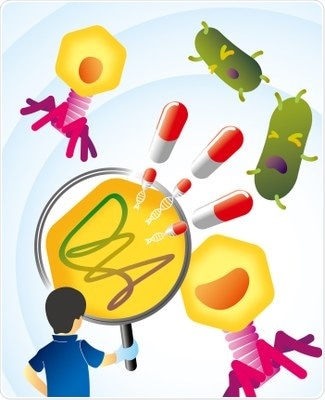Scientists from Osaka City University, The Institute for Medical Science, and The University of Tokyo have presented intestinal viral and bacterial metagenome data from the fecal samples collected from 101 healthy Japanese persons. This breakthrough research was published in the Cell Host & Microbe journal.

Phage-derived anti-bacterial enzyme attacks C. difficile. Image Caption: Illustration by Hideaki Miyauchi Satoshi Uematsu.
Exploiting the associations between the host bacteria and the phage, the new study identified phage-derived antibacterial enzymes that are known to regulate pathobionts. As a proof of concept, endolysins derived from phages have been shown to control Clostridium difficile infection in mice.
Overview
Dysbiosis refers to abnormalities that occur in human intestinal microflora. Such abnormalities have been linked to numerous diseases.
Altered diversity of microbes damages the positive effects of host intestinal microflora, causing certain symbiotic commensal microbes to obtain virulence properties, followed by their proliferation and direct involvement in disease development. Such bacteria are known as “pathobionts,” which are different from opportunistic microbes.
C. difficile is a spore-forming, Gram-positive anaerobic bacterium. This pathobiont typically causes nosocomial diarrhea after antibiotic treatment. Since the intake of antibiotics carries the risk of destroying beneficial bacteria and supporting dysbiosis, the development of techniques to particularly exploit intestinal pathobionts is very crucial.
Phages were sure to be applicable as a highly specific therapy for intestinal pathobiont elimination.”
Satoshi Uematsu, Professor, Osaka City University
The infectious relationships between bacteria and phages in the human intestine are crucial data for developing phage therapies. Called “viral dark matter,” since it is yet to be fully interpreted, scientists acquired metagenome data about the associations between the bacteria and the phages from the fecal samples collected from 101 healthy persons via the development of a virome analysis pipeline.
Using this data, scientists screened phages specific to C. difficile infection and discovered new antibacterial enzymes, both in vivo and in vitro.
“The accumulation of more metagenomic information on intestinal phages and bacteria will open up the possibility of developing treatments for a variety of dysbiosis-related diseases,” concluded Dr Kosuke Fujimoto and Professor Seiya Imoto.
Source:
Journal reference:
Fujimoto, K., et al. (2020) Metagenome Data on Intestinal Phage-Bacteria Associations Aids the Development of Phage Therapy against Pathobionts. Cell Host & Microbe. doi.org/10.1016/j.chom.2020.06.005.